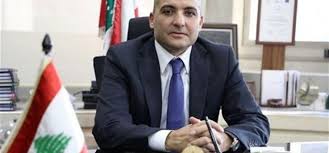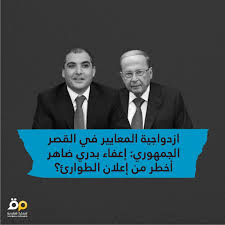Lebanese customs boss Badri Daher accused of illegally lifting a travel ban on a drug-smuggling Saudi prince.

Beirut, Lebanon – A formal arrest warrant has been issued against Lebanese customs chief Badri Daher over allegations of accepting a bribe, wasting public funds and misusing his position to allow a drug-smuggling Saudi prince to leave Lebanon without paying a multimillion-dollar fine.
Beirut Investigative Judge Charbel Abu Samra issued the warrant on Tuesday against Daher, who has already been detained for nearly three months on accusations of wilful negligence that led to the massive Beirut port explosion in August that killed more than 200 people.
Abu Samra’s decision followed Daher’s interrogation last month by the financial public prosecutor, who subsequently recommended charges be brought against him, based on a complaint filed by investigative journalist Riad Kobaissi and several lawyers.
Daher is accused of illegally lifting a travel ban on Saudi Prince Abdel Mohsen Bin Walid Bin Abdulaziz in July after the prince completed a prison sentence for attempting to smuggle nearly two tonnes of Captagon, an amphetamine-based drug, from Beirut to Saudi Arabia on board a private jet in 2015.
Daher denies illegally lifting the ban.
The prince, who was 29 years old at the time, had arranged for the roughly 10 million pills to be stashed in suitcases and cardboard boxes, on which were pasted his name and the word “private”, along with the green palm tree and crossed-swords emblem of the Saudi kingdom.
Despite the prince’s diplomatic status, customs officials insisted on searching the boxes and found the pills.
Captagon is a stimulant that became popular with front-line fighters in Syria following the outbreak of the country’s civil war, but also with party-goers and youths in Gulf Arab nations.
Lebanese security forces have in the past decade seized tens of millions of pills en route to the Gulf, primarily bound for Saudi Arabia and the United Arab Emirates.
According to Lebanese customs law, people convicted of drug-trafficking crimes are not allowed to leave the country until they pay a fine of either double or triple the amount of the goods seized.
In line with these regulations, Daher in February had issued a travel ban against the prince after his sentence ended, to make sure he did not leave Lebanon before paying the fine.
It was set at the time at some 65 billion Lebanese pounds ($43.5m at the official rate of 1,500 pounds to the US dollar), which is double the estimated 32.6 billion pounds worth of the drugs seized.
In a letter reviewed by Al Jazeera, the prince subsequently asked for a compromise – to pay just the principal amount of 32.6 billion pounds.
A judicial source, speaking under condition of anonymity, and Daher’s lawyer George Khoury told Al Jazeera this request was approved by Daher and other customs officials.
In late July, Daher asked the General Security agency, responsible for controlling Lebanon’s ports of entry, to lift the travel ban on the prince, according to another document seen by Al Jazeera.
The agency complied.
The catch? Prince Abdel Mohsen never paid the fine.
Special treatment?
During his interrogation by the financial public prosecutor last month, Daher allegedly claimed he had been asked by Lebanese President Michel Aoun himself to lift the travel ban on the Saudi prince, even though he had not paid the fine, the judicial source said.
Local news channel Al Jadeed, where Kobaissi works, also reported Daher had made this claim during his interrogation last month.
The presidency has both denied the president’s involvement and denied that Daher made the claim during his interrogation, and has threatened to take legal action against Al Jadeed for reporting Daher’s alleged statement.
Daher’s lawyer denied he had been paid or offered a bribe in the case, and instead said the customs chief’s decision to lift the ban had been motivated “primarily in an effort to boost relations between Lebanon and the brotherly nation of Saudi Arabia”.
He declined to comment on whether Daher had decided to do this on his own accord, or had been instructed to by other officials, including President Aoun.
Daher is heavily backed by Aoun and his son-in-law Free Patriotic Movement party leader Lebrun Bassil and regularly met with the president before he was detained in August.

Aoun refused to sign a decree dismissing Daher and two other state employees from their positions in the wake of the Beirut explosion.
Aoun also rejected the call of an international investigation of the devastating port explosion calling the idea a waste of time
ALJAZEERAL

Leave a Reply
You must be logged in to post a comment.